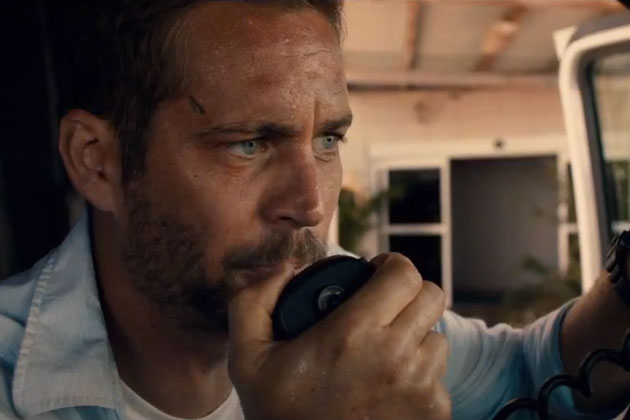
Paul Walker’s role in Hours is a departure from the most familiar Brian O’Conner that occupies the various Fast-speckled franchise. As Nolan Hayes, he is asked to find a deeper emotional peril as a husband who has recently lost his wife and a father who is on the verge of losing his prematurely-born daughter in the wake of Hurricane Katrina.
Set in New Orleans, Hours’ introductory credits quickly move from the calm before the storm to a thunderhead’s ominous encroaching and then on to the downpour and rain-spewing gutters. Amidst the storm, Nolan’s wife Abigail (Genesis Rodriguez) goes into labor, but something is amiss as she is not due for five more weeks. Shortly after, a doctor congratulates Nolan’s entry into fatherhood, and then – and only after Nolan asks about Abigail – informs the new father that he is also a new widow. Walker’s reaction to the news is believable, as are most of his actions throughout the film, but the doctor’s failure to inform Nolan of Abigail’s death before being prompted is only one of the flaws within the film.
I’m not one to critique bedside manner, but there is a disjointed feeling between each character, as if they are only there to fill space alongside Walker’s mostly one-man show. With the backdrop of Katrina, Hours is another addition to the survival genre, pitting Paul Walker against the continuously depleting battery that operates his premature daughter’s incubator, the rancid water that floods the hospital and the streets, and eventually, vagrants looking for medical supplies, pharmaceuticals, or just being generally bad guys. All in all, Walker holds his own and shows a refreshing depth that we haven’t seen in previous performances. However, the script is flimsy, so it’s often difficult to embrace Hayes as more than a stock protagonist waiting to be rescued.
At times, it feels as if Hours began as a love story between Abigail and Nolan, but found itself to be too milquetoast, so it cut their romance into saccharine flashbacks and spliced them amidst an overarching tragedy, whose emotional impact is still close enough to resonate with viewers.
At other times, there’s a poignancy present, but too soon overshadowed by a beeping monitor, a barking dog, or an intruder. The poignancy most often centers on the value of life and respect for the dead. At the beginning of the film – before the brunt of the storm and the subsequent evacuation and power outage – Nolan seeks for his wife’s body, only to stumble upon a floor with dead bodies covered in white sheets set upon gurneys as well as the floor. The bodies look well maintained in the sense that they are covered with clean sheets, but their bodies are disrespected by being placed on the floor. The orderly offers logically that they’ve run out of room, but Hayes refuses to accept his reason, persuading the orderly to help him place Abigail in a body bag and set her on a gurney. There is something touching in Hayes’ request, but something troubling in that another body would have had to be moved to accommodate Abigail’s. Hours would be a powerful if it elaborated on the hypocrisies of life and death in survival, instead of forcing each scene to try to top its predecessor. In one moment, we watch Nolan speak with his daughter, relaying how she came to be, beginning with the serendipitous way that he met Abigail. However, this becomes clear exposition and emotional pandering, as each scene afterward is ramped up to force tension, something that is rather unnecessary inasmuch as the title – and the frequent updates on how much time has elapsed without power – suggests that the film is about the waiting, the tedium of not knowing when or if you’ll be rescued, and not knowing if these are the last waning moment of your life.


